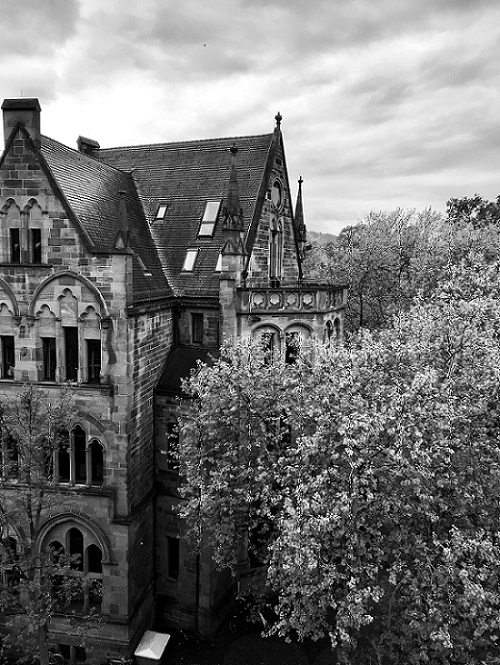History of the English Department at the University of Freiburg
 The Beginning
The Beginning
In July 2008, the English Department celebrated 200 years of English at the University of Freiburg. Indeed, in 1808, Professor Karl von Rotteck, a historian and political scientist, offered an English conversation course at the university, categorized in the course catalog under 'Exercises'. However, it took almost another 100 years before English Language and Literature was established as a discipline in its own right. The subject was initially considered a formal subdiscipline of German studies, and even after its official designation as an independent department, it remained structurally meagre. From 1911 until the establishement of the Federal Republic of Germany, the English Department was home to just one professorship and one lectorship, which at the very least were well-filled by Professor Friedrich Brie and selected native speakers.
Rebuilding after 1945 – Expansion and Current Home
The post-war period brought with it a time of continual expansion in the English Department. Since 1945, the Department has been housed in various buildings within the university centre. The relocations were the result of damages to older buildings during the war as well as the construction of new buildings and the growth of the Department, which necessitated increasing amounts of space.
After the war, the Department was initially housed in various rooms in the upper floors of KG I: one room served as an office for the only tenured professor at the time, Professor Heuer, the others as library and workspaces. After the appointment of Professor Pilch to a second chair in the Department and of Professor Link to a new professorship for American studies, the Department's personnel expansion was met with a spatial equivalent: in 1961, the Department relocated from KG I into several rented floors at Rotteckring 4. Professor Link's chair was housed above the building's first-floor drugstore, Professor Pilch's on the third floor, the fourth floor was home to departmental assistants, and Professor Heuer claimed the fifth. The library was distributed across all four floors, with its holdings distributed according to their relevance for the different chairs.
The Department's further expansion (increasing enrollment and the appointment of Professors Goetsch, Erzgräber and Schopf) necessitated renting additional rooms, found in close proximity at Bertoldstraße 33. As such, by the end of the 1960s, the Department was distributed across two separate buildings. In the 1980s, the university sought to move out of rented spaces as a cost-saving measure. In 1983, the school of music moved out of the 'Haus zur Lieben Hand', a centrally located university building, offering the opportunity to reduce rent costs by moving part of the English Department from Rotteckring 4 into the 'Haus zur Lieben Hand': the Department's library was moved back into one space there, and various offices were moved out of Rotteckring 4. Due to the then-perceived danger of house occupations by members of Freiburg's alternative scene, the Department moved into the building on the same day that the school of music left – at the time, leaving the building empty for just one day was seen as too risky.
Thanks to the renovation of the old university library over the course of the 1980s, the Department was once again able to come together under one roof: in 1986, the English Department moved from its offices at Bertoldstraße 33 and in the 'Haus zur lieben Hand' into the first through third floors of KG IV, where it remains today. The Seminar is home to 6 professorships, around 25 research associates as well as roughly 50 student assistants, tutors, administrators, secretaries and guest researchers. The English Department's library holdings of around 60,000 volumes are spread out over two large rooms (roughly 319 square metres) in the Verbundbibliothek. Unfortunately, the design of the renovated KG IV neglected to include social spaces. Despite the size of the institute, it cannot lay claim to a common room. This is, of course, particularly regrettable for scholars of English and American studies, whose study and work experience in anglo-american universities makes them particularly attuned to the community-building function of such a space.
The scope of English studies has also greatly expanded over the years. In addition to traditional English literature and linguistics – the cornerstones of the discipline – the department has incorporated cultural studies as a core component of its curriculum. The department’s geographical focus is also much broader now, encompassing the study of English literatures and cultures and varieties of English from beyond Britain and North America.

